Key takeaways:
- Non-disclosure agreements (NDAs) can protect sensitive information but may also create a culture of silence that undermines transparency and accountability in advocacy.
- Advocates must navigate the tension between confidentiality and the need to amplify marginalized voices, as NDAs can inadvertently restrict open dialogue and discussions of important issues.
- Ensuring effective communication about the implications of NDAs and creating safe spaces for sharing can help foster trust and encourage participation within advocacy efforts.
- Finding a balance between confidentiality and accountability is crucial, as suppressing necessary discussions can hinder progress towards justice and reform.
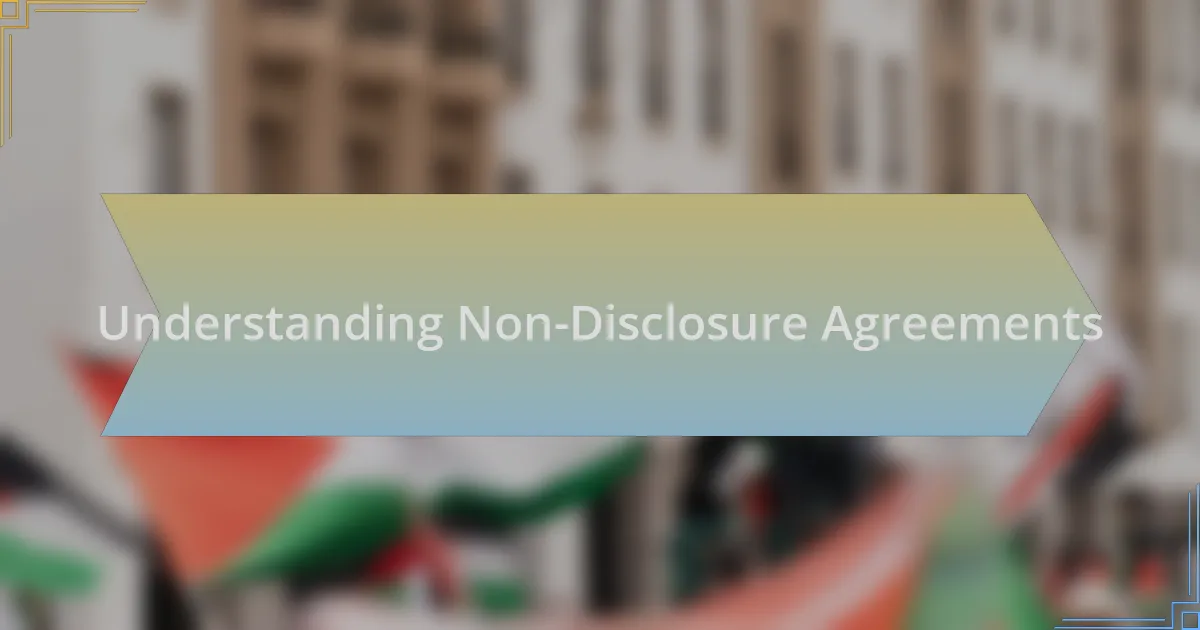
Understanding Non-Disclosure Agreements
Non-disclosure agreements (NDAs) are legal contracts designed to protect sensitive information from being disclosed to unauthorized parties. I remember my first experience with an NDA; I felt a mix of intrigue and apprehension as I signed a document that could bind my words in secrecy. It made me realize how crucial trust and confidentiality are in various professional settings.
The essence of an NDA is the promise of discretion, which can be incredibly empowering, yet it can also raise ethical questions. Have you ever wondered whether such agreements might silence genuine concerns or protect wrongdoing? In my experience, while NDAs can facilitate open communication, they sometimes blur the lines between confidentiality and accountability.
Understanding NDAs requires recognizing their potential benefits and hazards. While they can safeguard innovative ideas, they can also hinder transparency, especially in workplaces. I once worked with a colleague who felt stifled by an NDA, even as we brainstormed new solutions; it sparked a deep conversation about the balance between protection and openness.
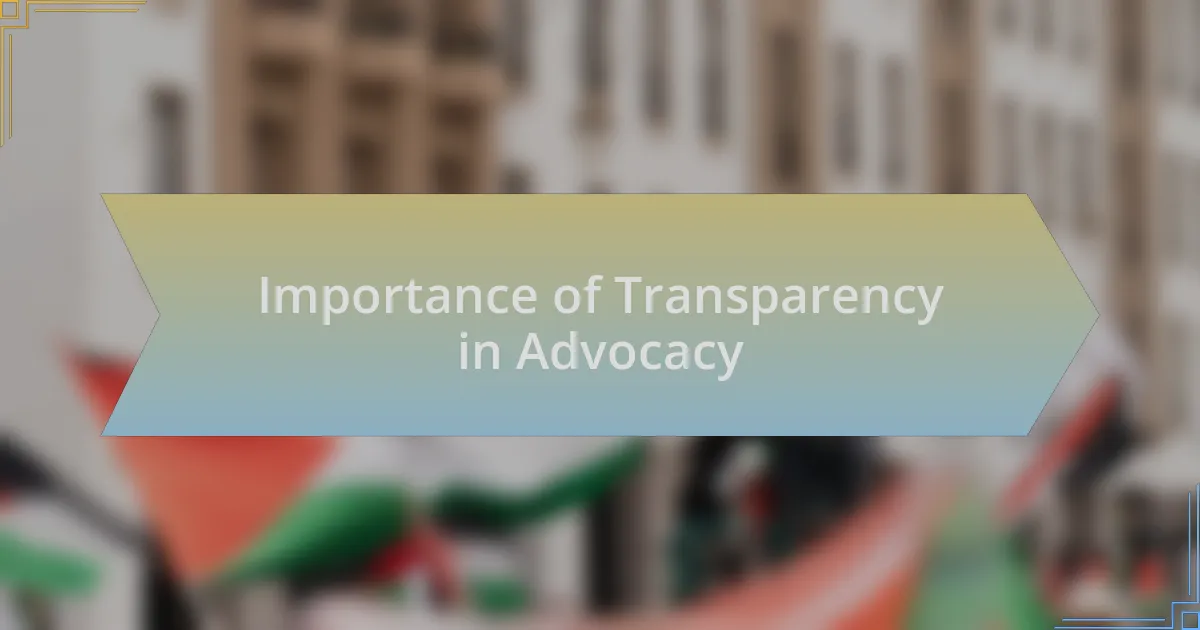
Importance of Transparency in Advocacy
Transparency in advocacy is essential for building public trust and ensuring that the voices of the marginalized are not drowned out. I recall a time when I was involved in a campaign advocating for housing rights, and the clarity of our message allowed community members to feel empowered. They knew exactly what we stood for, which made them more willing to participate and share their concerns.
When organizations operate transparently, they reveal their intentions and methods, which is crucial for accountability. I once attended a meeting where the leaders openly discussed their strategies and challenges; that openness fostered a sense of camaraderie among us. It made me think—how often do we see this level of honesty in organizations? Such transparency not only encourages participation but also invites constructive feedback, which can enhance the effectiveness of advocacy efforts.
Lack of transparency can lead to distrust and speculation, undermining the very goals advocates strive to achieve. I remember conversations with skeptics who questioned our motives simply because they felt excluded from our processes. It made me realize the importance of inviting diverse voices into the conversation, ensuring that everyone feels that their perspective matters. Isn’t it better to cultivate a culture of openness rather than operate in secrecy, where misunderstandings can fester?
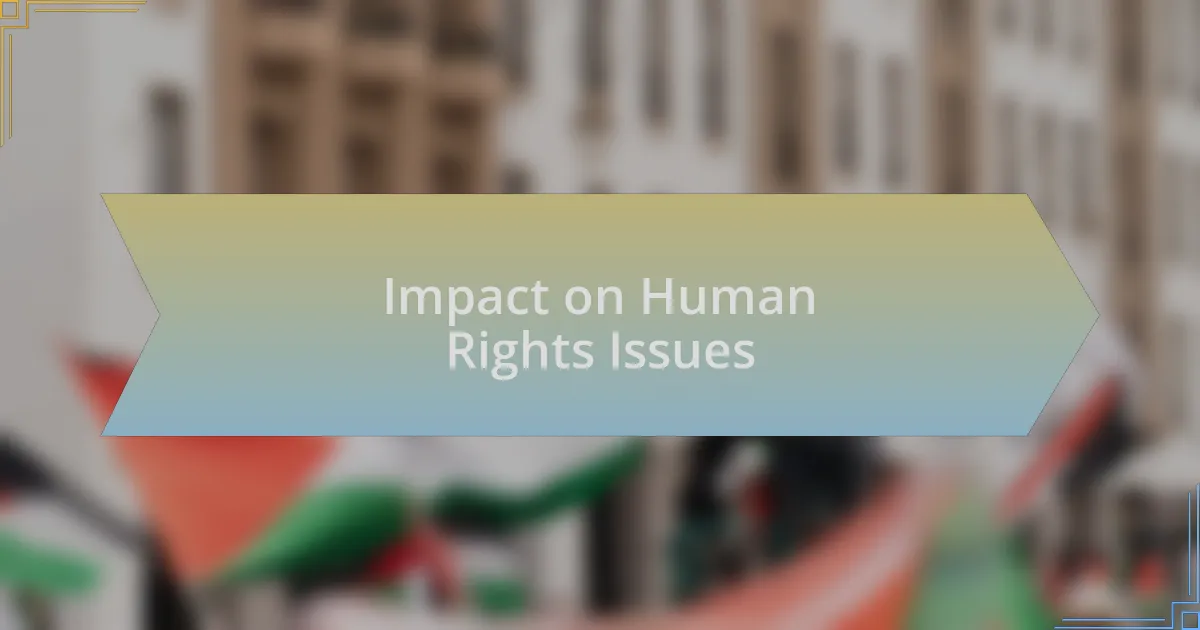
Impact on Human Rights Issues
The use of non-disclosure agreements (NDAs) can significantly undermine human rights advocacy. I remember participating in a workshop where the facilitator urged us to sign an NDA to protect sensitive information. It struck me then how this quest for secrecy could potentially silence whistleblowers or victims of rights violations, making it harder for their stories to be heard and addressed. Isn’t it ironic that in an effort to protect, we might inadvertently stifle the very voices that need to rise up?
Furthermore, NDAs often create a culture of fear among advocates, where individuals hesitate to speak out about unethical practices or violations they witness. I once witnessed a colleague refraining from sharing critical observations about a partner organization simply because they had signed an NDA. This made me ponder: what happens when advocates prioritize confidentiality over transparency? It creates a paradox where the very mechanisms meant to safeguard interests can lead to human rights issues being overlooked or misrepresented.
Moreover, the implications of such agreements stretch far beyond individual cases, affecting the broader fight for justice and equality. I recall seeing a report about an organization that subtly discouraged reporting human rights abuses due to concerns over legal ramifications tied to NDAs. It made me wonder how many critical stories are lost in the shadows because of these binding contracts, creating an insidious silence that advocates can ill afford. How can we truly promote human rights if the discussion is consistently constrained by legal barriers?
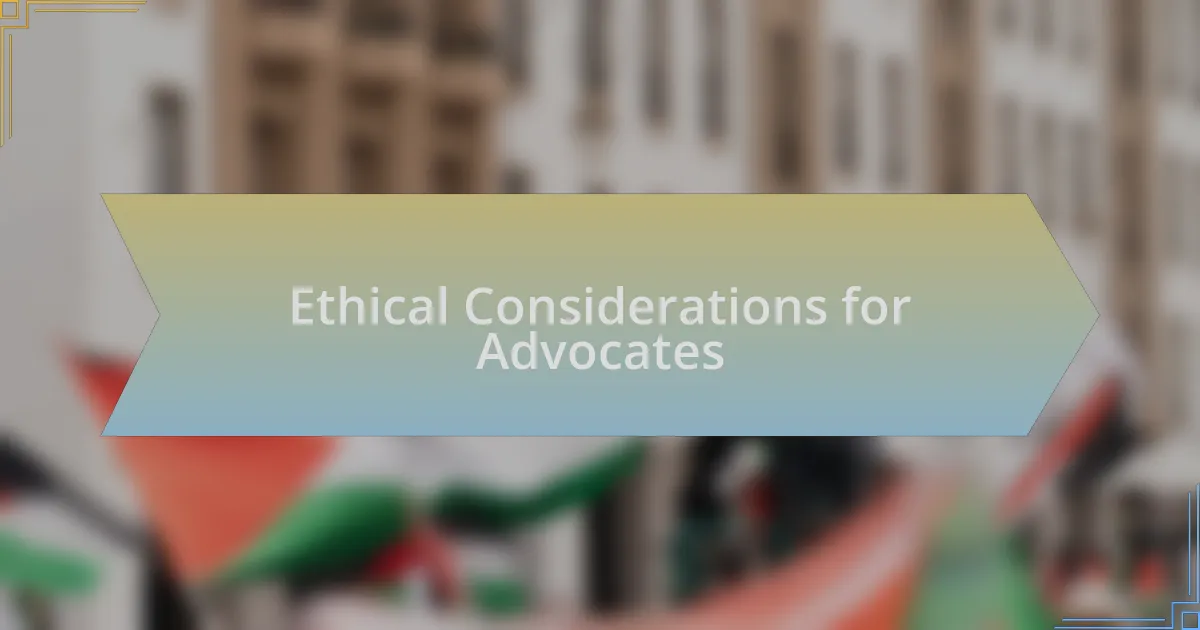
Ethical Considerations for Advocates
When considering the ethical implications of NDAs, advocates must reflect on their duty to protect the vulnerable. I recall a particularly poignant moment at a conference where a victim of abuse shared their story—only for some in the audience to later express concern over the ethical ramifications of their disclosures. It made me question: should the need for confidentiality overshadow the urgency of sharing experiences that could foster positive change?
The tension between confidentiality and transparency often weighs heavily on advocates. I once faced an internal struggle when a potential source for a campaign was hesitant to come forward, fearing legal repercussions from an NDA they had signed in a previous role. In that moment, I realized the profound impact of these agreements—what message does it send when those who fight for human rights feel compelled to muzzle their truths?
Moreover, advocates should recognize that NDAs can inadvertently undermine trust within the communities they serve. A colleague once shared an experience where an NDA halted a critical discussion about policy reform. This left me wondering: how can advocates build coalitions for change if transparency is sacrificed on the altar of legal protection? The ethical responsibility to amplify marginalized voices must remain paramount in our advocacy work.
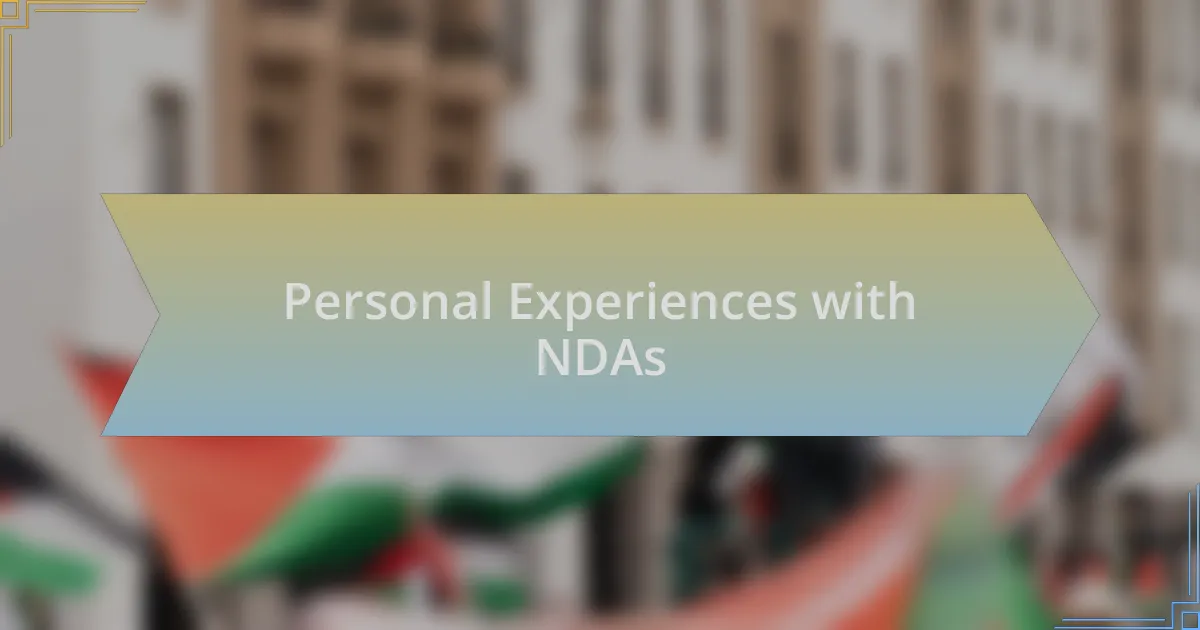
Personal Experiences with NDAs
In my journey through various advocacy roles, I’ve encountered NDAs that left me feeling conflicted. For instance, I once worked with a brilliant researcher whose groundbreaking findings on human trafficking were silenced by an NDA from a previous employer. It was frustrating to witness the suppression of vital information that could have empowered our advocacy efforts. How often do we lose valuable insights due to these agreements?
On another occasion, I was part of a project where an NDA caused hesitance among team members to share their personal experiences. I vividly remember a teammate, visibly anxious, deciding against contributing their story, fearing repercussions. It stirred a profound sense of sadness in me—how can we foster a community of healing if the very mechanism meant to protect can also isolate individuals?
These experiences have shaped my understanding of NDAs as double-edged swords. While they can protect sensitive information, they can also dismantle the very connections that make our advocacy work effective. Reflecting on these moments, I often wonder: should we prioritize legal safety over authentic voices? The conversation around NDAs remains crucial in ensuring our advocacy truly serves those it aims to protect.

Strategies for Effective Communication
Effective communication is paramount in any advocacy setting, especially when navigating the complexities of NDAs. I recall a workshop where facilitators encouraged open dialogue while still respecting confidentiality. This balance allowed participants to share insights and strategies without crossing legal boundaries. It highlighted how trust can be built, even within restrictive frameworks.
One tactic I’ve found particularly helpful is creating safe spaces for discussions. I once participated in a peer-led session designed to air concerns about NDAs without fear of reprisal. The relaxed atmosphere allowed everyone to express their thoughts, revealing shared apprehensions among my colleagues. Why should legal agreements stifle honest exchange? This approach reinforced my belief that transparency and comfort foster genuine engagement.
Additionally, I emphasize clarity in communication when discussing the impact of NDAs. Early in my career, I observed that simply explaining the implications of these agreements can ease anxiety. For instance, I presented a case study illustrating how another group trustfully navigated their NDA while still advocating for their cause. I often wonder if clearer communication could mitigate the shadows that NDAs cast on our efforts for justice.
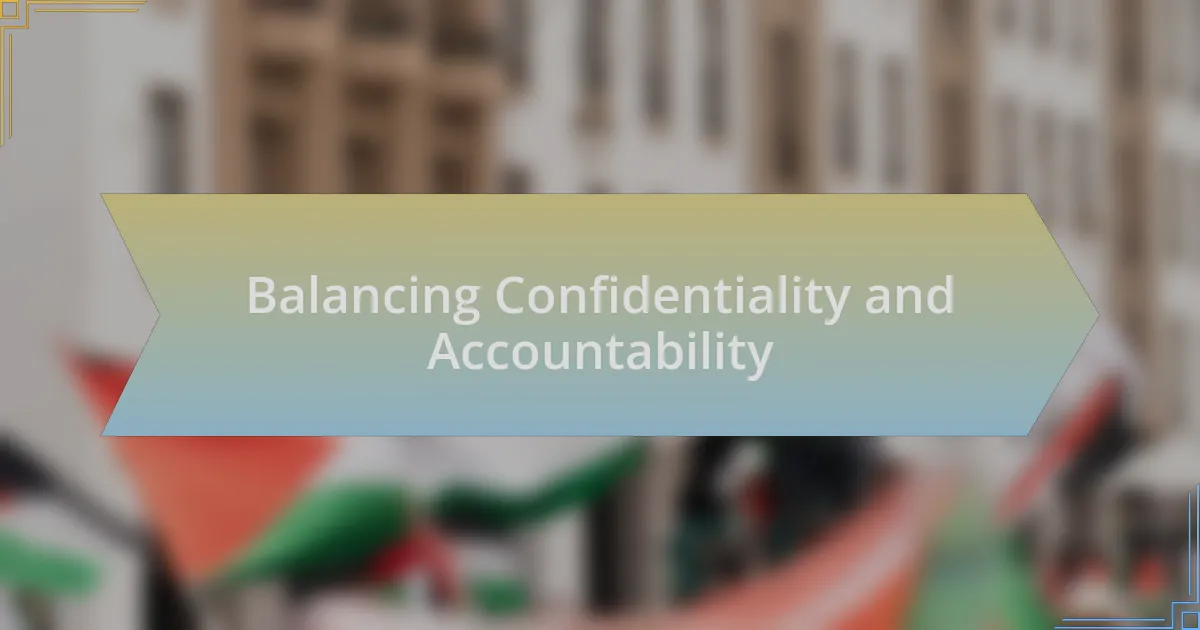
Balancing Confidentiality and Accountability
Striking the right balance between confidentiality and accountability is crucial. I once found myself in a situation where a prominent organization required signing an NDA for participation in a human rights campaign. While I understood the need to protect sensitive information, I couldn’t shake the feeling that this could suppress necessary accountability. How do we ensure that those in power remain answerable if everything is locked behind closed doors?
In another instance, I joined a roundtable discussion where participants shared their experiences with NDAs in various contexts. It became clear that many felt trapped, unsure of how to advocate for change while tethered to confidentiality. It struck me then: confidentiality should not be an excuse to avoid responsibility. How can we demand accountability from organizations if we can’t openly discuss their practices?
I firmly believe that fostering an atmosphere where individuals can voice concerns, even within NDA constraints, is essential. I once facilitated a meeting that focused solely on accountability—inviting people to express their hesitations about NDAs. The emotions in the room were palpable; people shared frustrations and fears of retaliation. It was a moment that highlighted just how vital it is for advocacy efforts to maintain transparency while respecting the boundaries that NDAs impose. What if we could redefine the conversation to prioritize both our obligations to uphold confidentiality and our commitment to accountability?